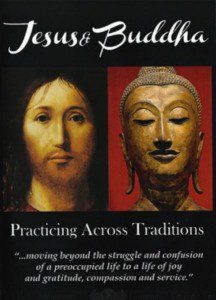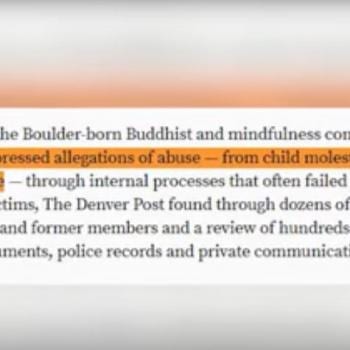
My news feed had an interesting title in it a week or so back, “In case you were wondering about Buddhism.”
“Yes,” I thought, “I am wondering about Buddhism…” So I clicked through to see what it was all about and found that it was a link from a fellow Patheos bloger, Mark Shea (Catholic and Enjoying It!). His introduction to the piece is short, simply calling it “a fine (and sympathetic) comparison and contrast between Buddhism and Catholic faith by Peter Kreeft.”
Unfortunately it doesn’t seem sympathetic to anyone familiar with Buddhism. And more distressing perhaps is that Kreeft is a philosophy professor – and so should know better. Yes, he works for a Catholic college and seems quite busy with a Catholic talking tour, but one would hope that academics, even when we disagree with other ways of seeing the world, would work a little to first understand the ‘other’, rather than rehashing old distortions and parochial simplifications.
Kreef begins with the all-too-common trope that the Buddha claimed to be a man, while Jesus ‘clearly’ claimed to be both ‘Son of Man’ and ‘Son of God.’ In fact, the Buddha denied both being a man and a god (and other things), telling his interlocutor to know him simply as awakened – buddhoti, (Doṇa Sutta AN.4.36). My understanding of this is that the Buddha was challenging Dona’s (and our) categorical preconceptions of the world: in our experience there are such-and-such types of being that we could encounter and the Buddha was urging us to see that what he -and his teaching- represented was something beyond our current typologies and limited experience.
Doug Smith covers much of the territory in this dispute with an excellent piece at the Secular Buddhism site.
Kreef continues: “Buddha said, “Look not to me, look to my dharma (doctrine)”; Christ said, “Come unto me.” Buddha said, “Be ye lamps unto yourselves”; Christ said, “I am the light of the world.”
In fact the Buddha said “He who sees me, sees the Dharma, he who sees the Dharma, sees me” (SN 22.87). His life and teachings form a mirror image of one another. And one should not get too hung up on him as a particular being, as he is simply one of many who have understood the true nature of things and overcome suffering.
Concerning God, Kreef writes that “Buddhism does not deny God. It is silent about God. It is agnostic, not atheistic.” This is a complex topic. As I wrote here:
“The Buddha didn’t endorse a creator God such as that found in general definitions of Western monotheism. However, in the Pali Canon there is found a complex pantheon of Brahmanic gods (and yakkhas) interacting with humans, including the [or ‘and the’] Buddha. Furthermore, there are Western conceptions of God that do not include all of the connotations found in traditional definitions.”
Kreef goes on to caricature Buddhist compassion (karuna) in somewhat babbling words that could be taken right out of a 19th century colonialist missionary’s account:
For Buddhism, egotism (selfish desire) causes the illusion of an ego. For the West, secular as well as religious, a real ego is the cause and egotism is the effect. Agape is a different effect from the same cause: altruism from the ego instead of egotism from the ego. To the Buddhist, agape is impossible; there can be no ego without egotism, no self without selfishness, because the self is not a real cause that might conceivably change its effect. Rather, the self is the illusion—effect of selfishness. There’s nobody there to love or to hate.
How can this apparent nihilism, this philosophy of nothingness, feel liberating to Buddhists? The answer is found in Buddha himself: his personality and the events of his life, especially his “great enlightenment.”
Oh dear. Where to begin?
I won’t. You can read it all for yourself, if you wish. Again, it’s sad to see anyone, especially an academic, distorting any religion in this way. Of course this might just be part of the great Catholic conspiracy, as Dan Brown has made clear to us in his novels 😉
As a commenter at Mark Shea’s blog notes:
“There is no comparison to the relationship of the Christian to God, which is what Kreeft is getting at, because the Christian God is fundamentally different in kind than the Buddhist gods.” Kreeft merely asserts this, and he does so without precedent or proof. I know this is a fundamental tenet of your faith, but it isn’t very convincing to anyone who isn’t already a member of your faith. It is lazy evangelizing.











